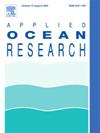Reduced order modeling of wave energy systems via sequential Bayesian experimental design and machine learning
IF 4.3
2区 工程技术
Q1 ENGINEERING, OCEAN
引用次数: 0
Abstract
Marine energy technologies face significant challenges in ensuring their survivability under extreme ocean conditions. Quantifying extreme load statistics on marine energy structures is essential for reliable structural design; however, this is a challenging task due to the scarcity of high-quality data and the inherent uncertainties associated with predicting rare events. While computational fluid dynamics (CFD) simulations can accurately capture the nonlinear dynamics and loads in extreme wave–structure interactions, providing high-fidelity data, extracting statistical information through these models is computationally impractical. This study proposes a reduced-order modeling framework for marine energy systems, enabling efficient analysis across diverse scenarios, and facilitating the quantification of extreme load statistics with significantly reduced computational cost. Specifically, a hybrid reduced-order or surrogate model for a wave energy converter is developed to map extreme sea states and design parameters to the resulting loads in the mooring system. The term ”hybrid” refers to the combination of Gaussian Process Regression (GPR) and Long Short-Term Memory (LSTM) neural networks. The model is developed using two distinct approaches: (1) a baseline approach that relies on existing CFD data for training and validation, and (2) an active learning approach that strategically selects the most informative CFD samples from regions of the input space associated with extreme mooring loads. This procedure iteratively refines the model while minimizing prediction uncertainty, making it particularly effective for real-world applications where obtaining each sample requires substantial time and resources. The developed model demonstrates its exceptional ability to efficiently predict complex load time series, including instantaneous peaks, at speeds significantly faster than traditional modeling methods. Subsequently, the model is utilized to effectively evaluate Monte Carlo samples, providing accurate estimates of the probability of extreme mooring loads. Understanding the expected extreme loads is essential during the design phase of marine energy systems, enabling cost reduction by optimizing strength margins, refining overly conservative safety factors, and enhancing overall system reliability.
求助全文
约1分钟内获得全文
求助全文
来源期刊

Applied Ocean Research
地学-工程:大洋
CiteScore
8.70
自引率
7.00%
发文量
316
审稿时长
59 days
期刊介绍:
The aim of Applied Ocean Research is to encourage the submission of papers that advance the state of knowledge in a range of topics relevant to ocean engineering.
 求助内容:
求助内容: 应助结果提醒方式:
应助结果提醒方式:


